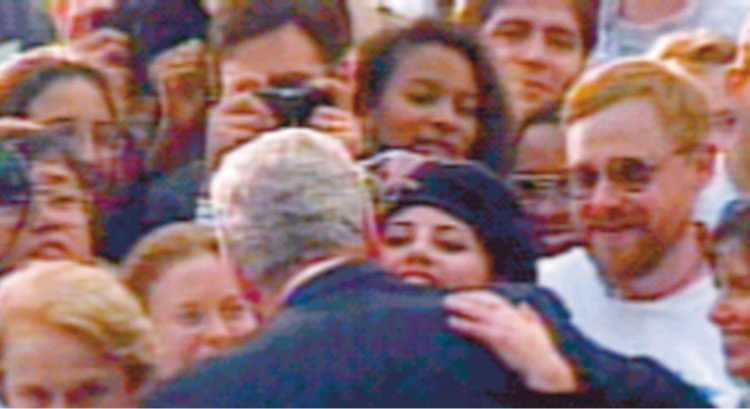Although President Clinton steadfastly denied allegations of womanizing, in January 1998 a judge ordered him to testify in Paula Corbin Jones’s lawsuit against him. Jones, who sought to strengthen her suit by showing that Clinton had a history of propositioning women, also subpoenaed a former White House intern. Her name was Monica Lewinsky.
Lewinsky and Clinton were separately asked if they had had an affair, and each denied the charge. When word of their alleged relationship was leaked to the press, Clinton declared in a TV news conference, “I did not have sexual relations with that woman, Miss Lewinsky.” Hillary Clinton denounced the allegations as part of a “vast right-wing conspiracy” against her husband.
Unbeknown to the Clintons, however, Lewinsky had been confiding to Linda Tripp, a former White House employee, and Tripp had secretly tape-recorded some twenty hours of their conversations. Tripp turned these tapes over to special prosecutor Starr, whose investigations of the Clintons’ roles in the Whitewater scandal had broadened into a more general inquiry. In the tapes Lewinsky provided intimate details of repeated sexual encounters with the president. Clinton and Lewinsky appeared to have lied under oath. Starr threatened to indict Lewinsky for perjury. In return for immunity from prosecution, she admitted that she had engaged in sexual relations with the president and that he and his aides had encouraged her to give misleading testimony in the Jones case.
When called in August to testify on videotape before the Starr grand jury, Clinton conceded that he had engaged in “inappropriate intimate contact” with Lewinsky. But he insisted, “I have not had sex with her as I defined it.” When pressed to supply his own definition, he responded with legalistic obfuscation: “My understanding of this definition is it covers contact by the person being deposed with the enumerated areas, if the contact is done with an intent to arouse or gratify.” Because Clinton had not intended to arouse or gratify Lewinsky, he had not “had sex” with her. He allowed that this definition was “rather strange.”
More legalisms followed. When asked if he had ever been alone with her, he responded, “It depends on how you define alone.” When asked if his lawyer had been correct when he had assured the judge in

A seemingly anonymous well-wisher from the crowd greets President Bill Clinton. When Clinton was later investigated for having an affair with Monica Lewinsky, a former White House intern, this photograph of the two surfaced. Clinton's lack of discretion struck many as self-destructive.
January that “there is absolutely no sex of any kind,” Clinton said that the statement was not untrue because “it depends on what the meaning of the word ‘is’ is.”
Clinton’s testimony infuriated Starr, who made public Lewinsky’s humiliatingly detailed testimony and announced that Clinton’s deceptive testimony warranted consideration by the House of Representatives for impeachment.
But throughout Clinton’s legal battles, opinion polls indicated that two in three Americans approved of his performance as president. Buoyed by the vibrant economy, most Americans blamed the scandal on the intrusive Starr nearly as much as the evasive Clinton. The November election proved disastrous for the Republicans, who nearly lost their majority in the House.
Clinton’s troubles, however, were by no means over. Republican leaders in the House impeached Clinton on the grounds that he had committed perjury and had obstructed justice by inducing Lewinsky and others to give false testimony in the Jones case. The vote closely followed party lines.
The impeachment trial in the Senate began in January 1999. Chief Justice William Rehnquist presided. The Republicans numbered fifty-five, enough to control the proceedings but twelve short of the two-thirds necessary to convict the president and remove him from office. Democrats, while publicly critical of Clinton’s behavior, maintained that his indiscretions did not constitute “high crimes and misdemeanors” as specified in the Constitution for removal from office. They prevailed. The article accusing Clinton of perjury was defeated by a vote of fifty-five to forty-five; on the article alleging obstruction of justice, the vote was fifty to fifty. Clinton remained president.
•••-[Read the Document Bill Clinton, Answers to the Articles of Impeachment at Www. myhistorylab. com




 World History
World History









